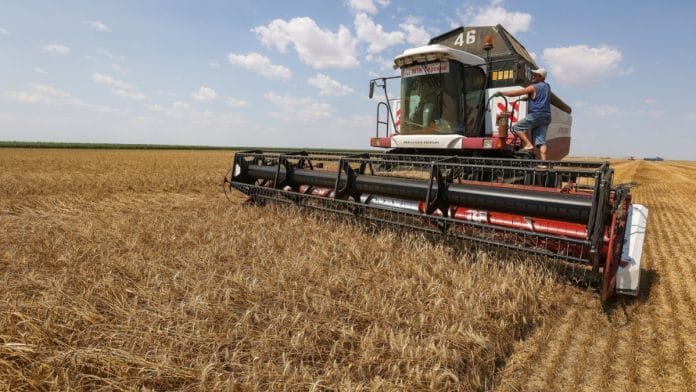One of Russia’s greatest strategic weaknesses has recently turned into an advantage. Climate change may tilt the balance further in Moscow’s favor.
Farm production — traditionally an area in which Russia has underperformed due to the low quality of its frigid, drought-prone agricultural land — has boomed over the past decade. That’s important, because food exports have long been a crucial contributor to security and diplomacy, and one in which the amply fed U.S. and European Union have an inbuilt advantage. Even if President Vladimir Putin is found to have overplayed a weak hand in his invasion of Ukraine, food is one area where Russia’s sway is set to increase rather than deteriorate in the coming decades.
The Soviet Union rose and fell because of grain. The collapse in farm production during World War One, as conscription turned more than 10 million peasants from food producers into consumers, led to years of food riots culminating in the revolutions of 1917.
Collectivization and the brutal famine that killed around 4 million Ukrainians in the the 1930s saw agricultural output stagnate, to the point where, by the 1970s, the U.S.S.R. was importing an unprecedented amount of grain. Moscow’s inability to pay for its cereal purchases when the mid-1980s oil price collapse reduced the value of its petroleum exports was a major factor in the fall of Soviet communism, amid rationing and renewed fears of starvation.
That situation has dramatically reversed in recent years. Since the 2014 invasion of Crimea, Russia has turned itself from one of the world’s major food importers to an exporter on a grand scale. Shipments of wheat overtook those from the European Union, U.S. and Canada in 2017 to return the country to its Tsarist-era status as the world’s biggest exporter of that grain. Chicago wheat futures on Friday hit their highest levels since 2008.
Meat imports, which overtook those of grain in the post-Soviet era as the biggest food drain on the current account, have withered away almost to nothing. Sales of seafood from the warming seas of the north Pacific to the increasingly affluent markets of South Korea and China have surged. Even dairy products — one area in which Russia is still in a deficit — are less of an issue than they may appear, since the imbalance is overwhelmingly with Moscow’s close ally in Belarus. The country is fully self-sufficient in basic foodstuffs, Putin declared triumphantly in 2020, before announcing caps on the price of products such as sugar and oil as costs surged later in the year.
The main cause of the higher output has been increasing fertilizer use and professionalization, especially in the southern agricultural belt sandwiched between Ukraine and Kazakhstan. That’s been driven by a conscious effort throughout the Putin era to reduce import dependency, with targets set and then tightened in updates to the country’s Food Security Doctrine in 2010 and 2020. A counter-embargo in 2014, in which the country swore off imports from Western countries in response to sanctions taken out following the annexation of Crimea, accentuated the trend.
This process is only going to accelerate as the planet warms. The latest report published Monday from the Intergovernmental Panel on Climate Change portrays a world in which plant and animal species are already fleeing increasingly torrid and turbulent tropical latitudes and shifting further north.
Even if warming is kept below 1.6 degrees Celsius by 2100, 8% of today’s farmland will be unsuitable for agriculture by the end of the century, according to the report. Ocean life is migrating toward the poles at a speed of 59 kilometers (36 miles) every decade, putting more of the rich fisheries of the Pacific into Russian waters. With climate change already slowing the growth in farm yields that have kept the world fed for the past century, much of the global population will be at increased risk of starvation, according to the IPCC. Russia will be well-placed to reap the strategic benefits of that more chaotic future, as the same factors open up new areas in the north with longer growing seasons and warmer conditions.
That’s a perverse reward for a country that has contributed amply to the warming climate through its role as the world’s biggest fossil fuel exporter — but it’s one that rival powers will have to reckon with.
In the 20th century, fossil fuels replaced food as one of the key ways for nations to throw their weight around in world affairs. The crisis in Ukraine may see that long tide start to ebb. If Europe was looking for additional reasons to switch to renewable power that can’t be cut off at the border, Russia’s behavior over its gas exports in recent months provides the perfect excuse. That won’t be the end of this story, however. Humanity’s oldest energy dilemma — how to source the grains, vegetables and meat that fuel our living bodies — will be with us for many years yet. –Bloomberg
Also read: Vladimir Putin’s strategic mistakes are making Zelensky a war hero






